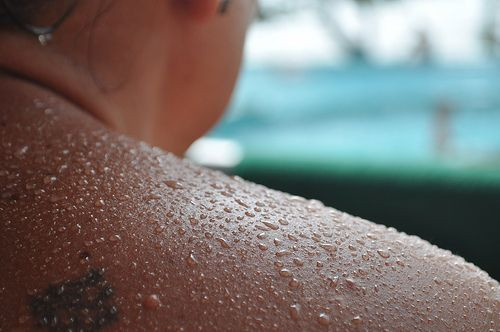Neck Injection Could Ease Hot Flashes At Onset Of Menopause; Most Effective In Moderate To Severe Cases

An anesthetic injection into a region of the neck that controls temperature regulation reduced the incidence of moderate to severe hot flashes in menopausal women, a recent study found.
Though still waiting for peer review, researchers at Northwestern University’s Feinberg School of Medicine presented their findings Saturday at the American Society of Anesthesiologists annual meeting in San Francisco. They found that half of all menopausal women who received the injection saw symptom reduction in their hot flashes for six months and felt less depressed or anxious following the treatment. The method could have deep implications for how to control impulses sent to the brain via nerves in the neck.
Patients who could benefit most from the treatment should fit a specific profile, according to study author Dr. David Walega.
"This is for people with multiple drenching sweats,” Walega told HealthDay, adding that some breast cancer patients stop taking their medication because it can cause hot flashes. The new treatment, he said, is for “women who can't function in the workplace, who have extreme anxiety preceding the hot flash. And when that happens several times a day, we also see anxiety and depression.”
Hot flashes are literal feelings of intense warmth that can cover the face, neck, and chest. They arise most often in women during menopause, a period in which the normal estrogen stores in a woman’s body begin to withdraw. Experts haven’t yet been able to pinpoint hot flashes’ exact cause, but they speculate it involves the interaction between the brain’s hypothalamus and the withdrawing estrogen stores. The hypothalamus regulates body temperature, so any fluctuation in estrogen could disrupt its function.
The new study sought to better understand the hypothalamus’ role as the body’s thermostat by targeting a portion of nerves in the neck called the stellate ganglion. Doctors have manipulated the region in the past to treat the night awakenings and hot flashes of breast cancer survivors, and researchers from the current study leaned on these findings in constructing their study.
Half of the 40 women involved in the study, all between 35 and 65 years old, received an injection of bupivacaine hydrochloride — a local anesthetic — while the others were given a placebo. All the women were either in natural or surgically induced menopause (a removal of the ovaries). According to Walega, the patient feels an intense pressure and moderate pain from the physician guiding the needle, but the entire procedure is over in 30 seconds.
The study’s results were promising, according to Walega. Fifty percent of participants given the anesthetic experienced fewer hot flashes, less feelings of depression, and a prolonged benefit upwards of six months. Walega intends to perform a larger, 200-person study that piggybacks on his most recent one. The study’s placebo group performed nearly as well the experimental group, however, giving one expert cause for concern.
"Invasive procedures often have a much stronger placebo effect," noted Dr. Grace Forde, an attending physician and pain management specialist at Syosset Hospital. Forde conceded that the treatment’s benefit still outweighs its cost, which Walega estimates, in pure dollars, will range from $750 to $1,000 once it reaches consumers.
"You can't put a price on quality of life,” Forde said. “I personally think it's worth it."



























